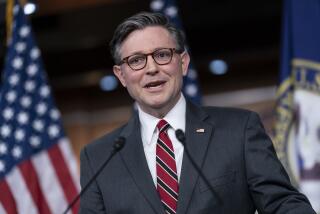Democrats Seek Funding to Boost Troop Readiness
WASHINGTON — The war on terrorism has already cost nearly two-thirds as much as the Vietnam War. But congressional Democrats, supported by top Army brass, complain that the administration is not spending enough to repair or replace weapons systems used in combat.
The top Democrats on the House Armed Services and Appropriations committees have held news conferences in the last two days, urging the administration to submit an emergency request for $17 billion for this year alone -- an amount suggested by Gen. Peter J. Schoomaker, the Army chief of staff.
“Our current readiness level puts us at strategic risk,” Rep. Ike Skelton of Missouri, the top Democrat on the Armed Services Committee, said Thursday. “It risks emboldening our enemies, and it threatens the security of this nation.”
President Bush has said that Americans are better off with U.S. troops battling terrorists overseas than if terrorists bring the war to America. But with the congressional midterm elections a few months away, Democrats have made it clear that they want to use military readiness to help turn the issue in their favor.
“We have not been straightforward with people about what this is going to cost,” said Rep. Neil Abercrombie (D-Hawaii), of the Armed Services Committee. “Let’s have this discussion between now and November.”
Republicans scoff at the Democrats’ strategy.
If the Democrats think the military isn’t ready, “why don’t they vote for more funding?” asked Carl Forti, communications director of the National Republican Congressional Committee, which coordinates GOP House candidates’ campaigns. “We would love to make their voting records an issue.”
In a letter to Bush this week, Reps. David R. Obey (D-Wis.) and John P. Murtha (D-Pa.), both outspoken opponents of the war, asked the administration to support a quick infusion of $17 billion for readiness.
Citing Schoomaker’s testimony before the House Armed Services Committee last month, they said shortages of equipment for training had left most active-duty combat units not in Iraq or Afghanistan unprepared for another crisis overseas.
“Thousands of the Army’s main fighting vehicles and trucks are lined up at repair depots around the country, sitting in disuse for lack of maintenance funding,” the lawmakers wrote.
Obey, the top Democrat on the Appropriations Committee, said the administration was trying to cover up the effects on the federal deficit of cutting taxes while fighting a war. “No other president has decided that in a time of war, you cut taxes and send the bill to our kids,” he said.
Murtha, the ranking Democrat on the Appropriations subcommittee on defense, said war costs were squeezing valuable pursuits out of the budget. With just 2 1/2 days of war expenditures, he said, the government could avoid the $664 million in cuts Bush has proposed in federal subsidies to student loans awarded by colleges.
The Democrats’ arguments were reminiscent of the guns-or-butter debates of the 1960s, when President Lyndon B. Johnson pursued his Great Society programs even as he stepped up the Vietnam War.
The Vietnam War cost $663 billion over 11 years when adjusted for inflation and expressed in 2007 dollars, according to the House Appropriations Committee. On the same basis, the war on terrorism has cost $446 billion in seven years, including $50 billion appropriated, but not yet spent, for the 2006 fiscal year, which begins Oct. 1.
In the 1960s, Johnson’s expansive budget policies overheated the economy and led to more than a decade of slow economic growth and high rates of inflation, Murtha told reporters.
Steven Kosiak, director of budget studies for the Center for Strategic and Budgetary Assessments, said readiness was a perpetual issue in wartime. “Everyone agrees that the administration has to spend money to bring the Army up to adequate readiness levels,” he said.
The problem has been aggravated during the current conflict, he said, by the surprisingly high cost of waging the war in Iraq. The reasons remain obscure, Kosiak said, but they include the costs of attracting young people to the all-volunteer Army, more expensive than the Army composed mostly of draftees in the Vietnam War.
Although spending for the war on terrorism is catching up with Vietnam in inflation-adjusted dollars, it remains far smaller as a share of the national economy, which has grown more than four times as fast as inflation since the Vietnam War started. The total defense budget, which reached a peak of 9.4% of U.S. economic output in 1968, is now 4.1%, Kosiak said.
More to Read
Get the L.A. Times Politics newsletter
Deeply reported insights into legislation, politics and policy from Sacramento, Washington and beyond. In your inbox three times per week.
You may occasionally receive promotional content from the Los Angeles Times.











